- Home
- Marion Meade
Dorothy Parker: What Fresh Hell Is This? Page 6
Dorothy Parker: What Fresh Hell Is This? Read online
Page 6
Edna Woolman Chase, the editor of Vogue, remembered Dorothy as “a small, dark-haired pixie, treacle-sweet of tongue but vinegar witted,” whose carryings-on created disturbances in the office. Mrs. Chase reigned over her staff in much the same way as Catherine the Great ruled Russia. An autocrat, she insisted that employees appear for work in hats, white gloves, and black silk stockings, even though she was the world’s biggest tightwad when it came to salaries. Idleness, and that included personal conversations during business hours, was forbidden. Her standards for conduct were rigorous. When an editor once tried to kill herself by diving in front of a subway train, Edna Chase was pained by her vulgarity. If a Vogue editor was forced to resort to suicide, she should have enough sense to swallow sleeping powders instead of leaving messes for the city sanitation department.
Since Dorothy always had a compulsion to bite the hand that fed her, the magazine soon became a natural target for her sarcasm. She ridiculed the office paintings, its marble tables and raw silk curtains, the uniformed maid who tiptoed around dusting desks and arranging fresh flowers. The book cases in the plush reception area contained fake books, she discovered, and later she described the waiting room as looking like the entrance to a whorehouse. In the women’s washroom she paid close attention to conversations, which she later recounted to Frank Crowninshield. “To whom should one properly address oneself for towels?” And: “How could Mrs. Astor think chinchilla appropriate for mourning?”
The magazine kept her busy. In addition to writing captions she also was responsible for proofreading and fact-checking. Sometimes it would be six o’clock before she left the office and headed uptown to her rooming house, where she had grown friendly with several of the male lodgers. One of them was Thorne Smith, the future humorist and author of Topper who was at this time working as an advertising copywriter. In the winter of 1916, notable for the lowest temperatures within memory, Dorothy and her new friends would troop upstairs after supper and keep themselves amused. “We used to sit around in the evening and talk. There was no money but Jesus we had fun.”
In the meantime she continued to submit verses to Vanity Fair, whose offices were conveniently located on the same floor so that she could easily stroll past Crowninshield’s desk and drop off her latest effort. That nothing met his standards is clear because the single poem he did publish during this period, “A Musical Comedy Thought,” is not especially good. Then she decided to take a plunge into free verse and came up with a concept that Crownie found exceptionally clever. “Women: A Hate Song” opened with a startling declaration: “I hate Women. They get on my Nerves.”
It happened to be true. She much preferred the company of men. If being one of the fellows was pleasant, being the only female among males was her ideal situation. Since she had a gift for evisceration, “Women: A Hate Song” enabled her to enjoy an orgy, happily lashing all the women she had never been able to stand. Those she hated most virulently were the ones who sewed their own clothing, the ones who scanned the newspapers for recipes and were forever telling her that they had to hurry home to see about dinner. “Oh,” she exploded, “how I hate that kind of woman.” By the sixth stanza she had managed to make mashed potatoes out of nearly every female alive in 1916 except Dorothy Rothschild. Crowninshield suggested that she sign the poem with the pseudonym “Henriette Rousseau.”
If the anthem of hate allowed her to abuse women, her next contribution to Vanity Fair was a truculent article that revealed equal scorn for the other sex. In “Why I Haven’t Married,” published later that year, she gleefully carved up the males she had dated, denounced them as idiots, and claimed they were the reasons she remained unwed. If these truly were representative of the men she had encountered, her feelings are easy to understand. There was a classic chauvinist who thought women belonged at home—hardly anyone in 1916 believed they didn’t—a Greenwich Village radical, and a lush in whose affections she would always rate third, after “first and second, Haig and Haig.” After skewering half a dozen men with the collective appeal of a dish of boiled turnips, she went on to present a final portrait, one of special interest because he was the only man to merit her praise. Paul, extolled as a “Vanished Dream,” she judged to have the makings of an ideal husband. He was utterly confectionary, “an English-tailored Greek God, just masterful enough to be entertaining, just wicked enough to be exciting, just clever enough to be a good audience.” In a moment of absentmindedness, however, this bonbon had married “a blonde and rounded person whose walk in life was upon the runway at the Winter Garden.” The smitten Dorothy assured Vanity Fair readers that she would never get over the loss of this sublime creature.
In reality, the impeccably dressed god had not married a chorine at all. He was an eligible bachelor. Having only recently made his acquaintance and still feeling awed, she could not predict what he might do. She was merely sure of what he was not likely to do, and that was to marry her.
During the summer of 1916, drawn as always to those ubiquitous hotel verandahs, she had spent her vacation in Branford, Connecticut. It was at a hotel there that she had met and fallen in love with the unobtainable—or so she assumed. Sexually, her basic taste ran to men who were exceptionally good-looking but who were, if not exactly dumbbells, at least her intellectual inferiors, the male equivalent of the beautiful show girl to whom she had married off her god in the pages of Vanity Fair. Tall, slender, and blond, he was as pretty as some picture-book prince. He dressed well, as princes are wont to do. Of course princes also are apt to be dullards, but this man had demonstrated a capacity for wicked behavior, and he also seemed clever and entertaining. While he did not appear indifferent toward her, there were other women pursuing him and he naturally was busy playing the field. Dorothy began to prepare herself for rejection.
Edwin Pond Parker II was twenty-three and worked as a stockbroker at Paine Webber. He came from Hartford and had been in New York only long enough to establish himself in Wall Street, the beginning of a promising and substantial career.
He was a descendant in the ninth generation of William Parker, who had arrived in Hartford from England in 1636. The ministry became the Parker family’s profession, although the Ponds also were clergymen. Ed Parker’s grandfather, the Reverend Edwin Pond Parker, had been pastor of the Second Church of Christ in Hartford for nearly sixty years. He was not only the state’s leading Protestant clergyman and one of Hartford’s most distinguished citizens, but also he was a magisterial and dominating presence in his own family. Ed’s father, Harris, had declined to enter the ministerial path, instead choosing the sporting goods business, but people in Hartford continued to associate the Parkers with Congregational clergy and to recognize the house on South Beacon Street as the old reverend’s residence. The weight of all this had shaped young Ed Parker into a galloping atheist and something of a rebel.
At Branford, he was quick to poke fun at his pious Parker and Pond forebears, whom he derided as fanatics who most likely had burned their share of witches. Dorothy, sensing his scorn for religion and God, impulsively confessed that her family had been Jews, information that Ed Parker promptly dismissed as irrelevant. He could not imagine why it concerned her.
Aside from his disdainful attitude toward the church, he had a wild streak that proved irresistible to Dorothy. In an autobiographical story, she would recall their courtship:She liked him immediately.... She was enormously amused at his fast, slurred sentences, his interpretations of apt phrases from vaudeville acts and comic strips; she thrilled at the feel of his lean arm tucked firm beneath the sleeve of her coat; she wanted to touch the wet, flat surface of his hair. He was as promptly drawn to her.
She began calling him Eddie; he called her Dear.
In the city, they soon fell into the habit of spending their evenings together, and now her friends at the rooming house saw little of her. Eddie was fond of the theater, not the serious dramas she enjoyed but musicals that offered bevies of scantily dressed beauties. Since he had money, they i
nevitably wound up dining and drinking at expensive restaurants. She did most of the dining; he did all of the drinking. In fact, he drank hugely, steadily, which brought no objections from her because she noticed that the more he drank the funnier he got. His drinking amused her, and she treated his repeated references to hangovers as jokes because he never appeared really ill, only unsteady on his feet. What she liked best about him was his exhilaration, a cockiness that she chose to interpret as a sign of health and energy.
She hated the taste of liquor herself and refused to touch it.
During that fall and winter, she freely poured into Edwin Parker her whole self, all the love she had to give. Even though their involvement continued to deepen, she was far from convinced that anything serious would come of it. As a love-starved and insecure young woman, she overlooked defects in a man she judged her superior because her attention was focused on her own shortcomings. Since he possessed physical beauty and an impressive pedigree, the sense of myopia unavoidably deepened. Eddie, in contrast to other men she had met, professed to admire independent women who were able to hold jobs and look after themselves. Never did he speak of incarcerating a wife in a suburban backwater, nor could she imagine him sitting before a fire on a wintry evening reading aloud from “The Song of Hiawatha.” On the contrary, he was always ready to raise hell and tear up the town.
Nevertheless, she took care to minimize her professional ambitions around him for fear of disturbing his masculine sensibilities. She also continued to feel uneasy about his family, especially his grandfather. That he made fun of the Parkers made no difference. If these patricians ever learned of her Jewishness, she could just imagine their dismay, how quickly they would snatch him back to their black-robed bosoms.
Many years later, in a hard mood, she told friends that she had wanted to marry Eddie because he had a nice, clean name. The people to whom she made this admission were Jewish; while they loved her enough not to take offense, they could not help lifting their eyebrows: Did she think their names were unclean? It was not a comparable situation at all, she protested, because their Jewish names sounded acceptable in some inexplicable way that Rothschild did not.
The truth was that in 1916 her desire for independence evaporated, along with her fantasy of becoming Edith Sitwell, and she longed to be a wife like all the other women she knew. Making bright conversation with her boardinghouse comrades had grown exhausting and she realized for the first time that it required effort to be a good sport with men. All she wanted was to be alone with Eddie, as if he and he only was the remedy for her maladies. She began to see marriage breaking on her horizon like a rainbow that promised sunlight and safety.
Though it was true that she detested the name Rothschild, Eddie’s name would have meant nothing to her had it not been attached to a man she adored. Edwin Pond Parker II resembled a package encased in shiny wrappings. At twenty-three, dazzled and in love, she did not pause to wonder very much about its contents.
In the spring of 1917 the future resolved itself. On April 2, President Woodrow Wilson, reelected five months earlier on promises to keep the country out of war, delivered a war message to a joint session of Congress and received a standing ovation. Immediately Eddie Parker began to talk about enlisting, although the idea of killing anyone, even a German, made him uncomfortable. He planned to volunteer as an ambulance driver. No sooner did he make this decision than he asked Dorothy to marry him. Under the circumstances, it seemed like the sensible thing to do.
Some time that spring he escorted her to Hartford to meet his family. Dora and Harris Parker were polite to her, as were Eddie’s little brother Harris, Jr., and his sister Ruth, herself recently engaged and preparing for her wedding. Despite their cordiality, Dorothy was quick to notice that they were treating her like a New York Jew on the make, an outsider with stylish suits and advanced ideas about careers for women. They had an endless supply of unflattering remarks to make about her hometown, telling her that they visited New York once or twice a year but were always glad to get home because they wouldn’t live down there if Dorothy gave them the place. They guessed she was pretty happy to get away for a few days. They further put her in her place by raving about the Reverend Parker, a real author who had written countless books and hymns and frequently lectured on literary topics. The Reverend Parker, she learned, was an intimate friend of Samuel Clemens.
Having cemented a cool smile to her lips, Dorothy struggled to keep from strangling on her indignation. At last, Eddie’s eighty-one-year-old grandfather appeared to inspect her. After arriving at his son’s house on Evergreen Avenue on the arm of his second wife, Laura, he called the family into the parlor for prayers. Dorothy’s head was bowed when she heard him intone, “Oh Lord, grant to the unbeliever in our midst the light to see the error of her ways....” In the next breath he referred to her as “a stranger within our gates.” Stupefied at his mean spirit, she was harshly reminded of the chasm separating New England Congregational pulpits and the Lower East Side sweatshops. If she had felt no harmony with the Jews, it was now clear that she had even less in common with these Hartford Brahmins, “toadying, in sing-song, to a crabbed god.”
In the following weeks, she hid her rage by making fun of the Parkers and by clinging ever more tightly to Eddie. Her questions became relentless: Did he love her? Did he understand how truly she loved him? how sadly she would miss him? His responses seldom satisfied her. Since he was planning to marry her, he failed to understand what further proof of his love she wanted.
On the last day of June 1917, they were married in Yonkers, New York, a small city in suburban Westchester County. On the marriage license application, Eddie listed his occupation as stockbroker and Dorothy gave hers as “none.” In view of their antagonism toward religion, it is interesting that they observed the usual sacraments. A Reverend J. M. Ericsson performed the ceremony before three witnesses, obliging strangers whom the minister had hastily rounded up. After her humiliating treatment by the Parkers, she refused to have them at her wedding. No Rothschild was present either, nor did she and Eddie invite any of their friends. Soon afterward he joined the 33rd Ambulance Corps, 4th Division, and departed for Summit, New Jersey. One can imagine how disoriented Dorothy must have felt: She had been a bride “for about five minutes” before her husband had gone off and she found herself alone again.
Even before Eddie left, Dorothy had begun developing herself as a writer. Her earliest journalism, while written in the first person, was rooted almost entirely in what she, or her editors, hoped would sell rather than in her own experiences or memories. With her gift for making clever observations, she was able to tell a kind of truth but it was not uniquely hers. Vanity Fair had asked for several more free-verse hate songs—she attacked relatives, actresses, and men—and Edna Chase had agreed to try her as a special-features writer. One of her articles dealt with fashionable breeds of dogs, other pieces covered home decoration, hair and beauty care, knitting, and weddings, themes that have always been the staple fare of fashion magazines. Dorothy’s treatment of these subjects was unusual because she played with them and invariably wound up mocking them. When she wrote about interior decoration, recklessly titling the piece “Interior Desecration,” she made people furious. Chase never forgot that “more than one decorator swallowed hard and counted ten before expressing his feelings about it.” The flak resulted less from Dorothy’s cynical observations about furnishings than from her offensive portrait of an hysterical and unmistakably homosexual decorator. Mrs. Chase, who apparently had not thought to question the article prior to publication, was not amused.
Whenever Vogue needed a guinea pig, Dorothy volunteered. She tested beauty preparations, diets, and exercise regimens, and she agreed to submit her head to a permanent wave at a time when such procedures were still hazardous. Chase had to admit that getting the permanent had taken “rare courage,” but it was also clear that Dorothy was developing into a problem writer.
At Vanity Fair, Frank Crown
inshield could not help noticing Dorothy’s work, and he also must have realized that she was training herself to write the Frank Crowninshield genre. This called for, above all, a good sense of what was clever and entertaining. The formula, subsequently summed up by Robert Benchley as the Elevated Eyebrow School of Journalism, was by no means simple to master. You could write about practically any subject you wished, no matter how outrageous, so long as you said it in evening clothes. Crownie had no objection to serious topics and would publish, for example, a report on the Russian Revolution, but it had to be showered with references to debutante dinners, Grolier bindings, and French literature, then adorned with drawings by his favorite illustrator, Fish. Finally, it would be sandwiched between a survey of the polo season and “How to Be Idle Though Rich,” but at least it would be published.
In some ways the Frank Crowninshield genre was more china-painting than writing. It took Dorothy only a few months to get the hang of Crownie’s style. Then she spent the next decade trying to unlearn it.
Unlike Vogue, Vanity Fair seemed more like a playpen than an editorial office. Visitors had been known to whistle, throw paper darts, and play charades. Crowninshield proudly likened his private office to “a combined club, vocal studio, crap game, dance-hall, sleeping lounge, and snack bar,” and it was apparent that the magazine flourished on chaos. Vanity Fair, barely four years old, had already become publishing’s most fabulous success story, a financial winner that carried more advertising than any other monthly with page after glossy page of Rolls-Royces, diamond necklaces, and other gewgaws for the conspicuously wealthy. Crownie, however, could not have cared less about advertisers. His dedication was to the theater—and to painting, literature, dance, poetry, music, and satire—and he was as obsessive about exploration as Henry the Navigator was, fervently cruising the capitals of Europe and the drawing rooms of Southampton to seek out the most heretical work being done. When he had unearthed a work he feared too esoteric, he would tell his staff, “Remember, there’s an old lady sitting in Dubuque, and she has to be able to understand everything we print,” but he was the first to ignore this old publishing cliché. To the American public he would introduce a long line of innovators, from Picasso and Matisee and Beaton to Colette, Huxley, and Millay. Dorothy was determined to enter this exciting, elite club.

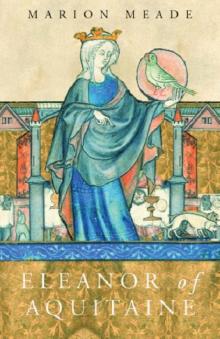 Eleanor of Aquitaine
Eleanor of Aquitaine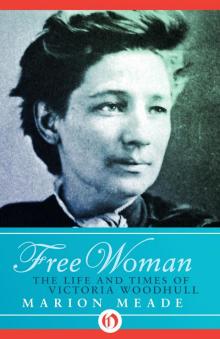 Free Woman
Free Woman Unruly Life of Woody Allen
Unruly Life of Woody Allen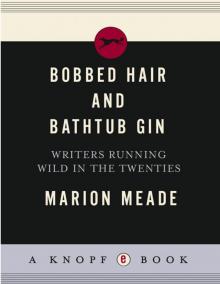 Bobbed Hair and Bathtub Gin
Bobbed Hair and Bathtub Gin Madame Blavatsky
Madame Blavatsky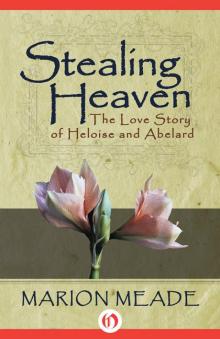 Stealing Heaven
Stealing Heaven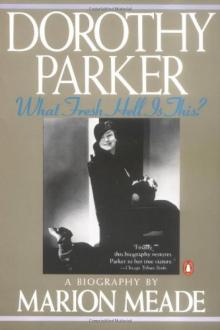 Dorothy Parker: What Fresh Hell Is This?
Dorothy Parker: What Fresh Hell Is This?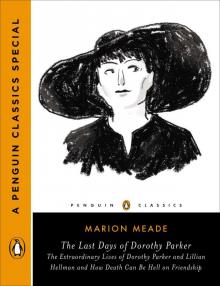 The Last Days of Dorothy Parker
The Last Days of Dorothy Parker